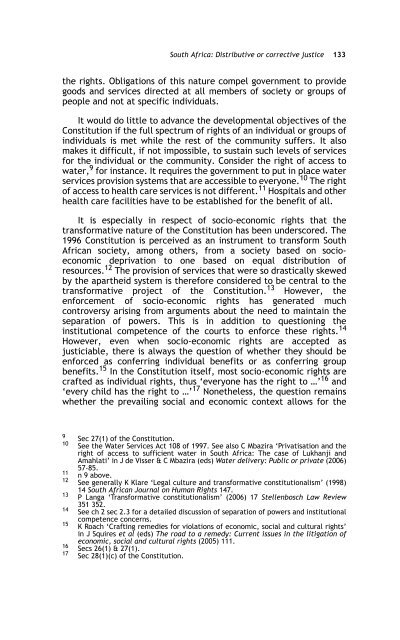LITIGATING SOCIO-ECONOMIC RIGHTS IN SOUTH AFRICA - PULP
LITIGATING SOCIO-ECONOMIC RIGHTS IN SOUTH AFRICA - PULP
LITIGATING SOCIO-ECONOMIC RIGHTS IN SOUTH AFRICA - PULP
You also want an ePaper? Increase the reach of your titles
YUMPU automatically turns print PDFs into web optimized ePapers that Google loves.
South Africa: Distributive or corrective justice 133<br />
the rights. Obligations of this nature compel government to provide<br />
goods and services directed at all members of society or groups of<br />
people and not at specific individuals.<br />
It would do little to advance the developmental objectives of the<br />
Constitution if the full spectrum of rights of an individual or groups of<br />
individuals is met while the rest of the community suffers. It also<br />
makes it difficult, if not impossible, to sustain such levels of services<br />
for the individual or the community. Consider the right of access to<br />
water, 9 for instance. It requires the government to put in place water<br />
services provision systems that are accessible to everyone. 10 The right<br />
of access to health care services is not different. 11 Hospitals and other<br />
health care facilities have to be established for the benefit of all.<br />
It is especially in respect of socio-economic rights that the<br />
transformative nature of the Constitution has been underscored. The<br />
1996 Constitution is perceived as an instrument to transform South<br />
African society, among others, from a society based on socioeconomic<br />
deprivation to one based on equal distribution of<br />
resources. 12 The provision of services that were so drastically skewed<br />
by the apartheid system is therefore considered to be central to the<br />
transformative project of the Constitution. 13 However, the<br />
enforcement of socio-economic rights has generated much<br />
controversy arising from arguments about the need to maintain the<br />
separation of powers. This is in addition to questioning the<br />
institutional competence of the courts to enforce these rights. 14<br />
However, even when socio-economic rights are accepted as<br />
justiciable, there is always the question of whether they should be<br />
enforced as conferring individual benefits or as conferring group<br />
benefits. 15 In the Constitution itself, most socio-economic rights are<br />
crafted as individual rights, thus ‘everyone has the right to …’ 16 and<br />
‘every child has the right to …’ 17 Nonetheless, the question remains<br />
whether the prevailing social and economic context allows for the<br />
9<br />
Sec 27(1) of the Constitution.<br />
10 See the Water Services Act 108 of 1997. See also C Mbazira ‘Privatisation and the<br />
right of access to sufficient water in South Africa: The case of Lukhanji and<br />
Amahlati’ in J de Visser & C Mbazira (eds) Water delivery: Public or private (2006)<br />
57-85.<br />
11 n 9 above.<br />
12<br />
See generally K Klare ‘Legal culture and transformative constitutionalism’ (1998)<br />
14 South African Journal on Human Rights 147.<br />
13 P Langa ‘Transformative constitutionalism’ (2006) 17 Stellenbosch Law Review<br />
351 352.<br />
14 See ch 2 sec 2.3 for a detailed discussion of separation of powers and institutional<br />
competence concerns.<br />
15<br />
K Roach ‘Crafting remedies for violations of economic, social and cultural rights’<br />
in J Squires et al (eds) The road to a remedy: Current issues in the litigation of<br />
economic, social and cultural rights (2005) 111.<br />
16<br />
Secs 26(1) & 27(1).<br />
17 Sec 28(1)(c) of the Constitution.
















